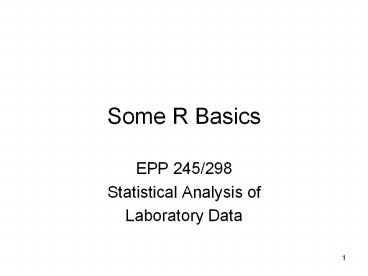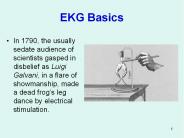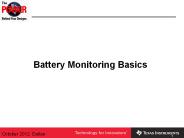Some R Basics - PowerPoint PPT Presentation
Title:
Some R Basics
Description:
R and Stata both have many of the same functions. Stata can be run ... plot(std.wright,mini.wright,xlab='Standard Flow Meter', ylab='Mini Flow Meter',lwd=2) ... – PowerPoint PPT presentation
Number of Views:24
Avg rating:3.0/5.0
Title: Some R Basics
1
Some R Basics
- EPP 245/298
- Statistical Analysis of
- Laboratory Data
2
R and Stata
- R and Stata both have many of the same functions
- Stata can be run more easily as point and shoot
- Both should be run from command files to document
analyses - Neither is really harder than the other, but the
syntax and overall conception is different
3
Origins
- S was a statistical and graphics language
developed at Bell Labs in the one letter days
(i.e., the c programming language) - R is an implementation of S, as is S-Plus, a
commercial statistical package - R is free, open source, runs on Windows, OS X,
and Linux
4
Why use R?
- Bioconductor is a project collecting packages for
biological data analysis, graphics, and
annotation - Most of the better methods are only available in
Bioconductor or stand-alone packages - With some exceptions, commercial microarray
analysis packages are not competitive
5
Getting Data into R
- Many times the most direct method is to edit the
data in Excel, Export as a txt file, then import
to R using read.delim - We will do this two ways for some energy
expenditure data - Frequently, the data from studies I am involved
in arrives in Excel
6
energy packageISwR
R Documentation Energy expenditure Description
The 'energy' data frame has 22 rows and 2
columns. It contains data on the energy
expenditure in groups of lean and obese
women. Format This data frame contains
the following columns expend a numeric
vector. 24 hour energy expenditure (MJ).
stature a factor with levels 'lean' and
'obese'. Source D.G. Altman (1991),
_Practical Statistics for Medical Research_,
Table 9.4, Chapman Hall.
7
gt eg lt- read.delim("energy1.txt") gt eg Obese
Lean 1 9.21 7.53 2 11.51 7.48 3 12.79
8.08 4 11.85 8.09 5 9.97 10.15 6 8.79
8.40 7 9.69 10.88 8 9.68 6.13 9 9.19
7.90 10 NA 7.05 11 NA 7.48 12 NA
7.58 13 NA 8.11
8
gt class(eg) 1 "data.frame" gt t.test(egObese,eg
Lean) Welch Two Sample t-test data
egObese and egLean t 3.8555, df 15.919,
p-value 0.001411 alternative hypothesis true
difference in means is not equal to 0 95 percent
confidence interval 1.004081 3.459167 sample
estimates mean of x mean of y 10.297778
8.066154 gt mean(egObese)-mean(egLean) 1
NA gt mean(egObese19)-mean(egLean) 1
2.231624 gt
9
gt eg2 lt- read.delim("energy2.txt") gt eg2
expend stature 1 9.21 Obese 2 11.51
Obese 3 12.79 Obese 4 11.85 Obese 5
9.97 Obese 6 8.79 Obese 7 9.69
Obese 8 9.68 Obese 9 9.19 Obese 10
7.53 Lean 11 7.48 Lean 12 8.08
Lean 13 8.09 Lean 14 10.15 Lean 15
8.40 Lean 16 10.88 Lean 17 6.13
Lean 18 7.90 Lean 19 7.05 Lean 20
7.48 Lean 21 7.58 Lean 22 8.11 Lean
10
gt class(eg2) 1 "data.frame" gt t.test(eg2expend
eg2stature) Welch Two Sample
t-test data eg2expend by eg2stature t
-3.8555, df 15.919, p-value
0.001411 alternative hypothesis true difference
in means is not equal to 0 95 percent confidence
interval -3.459167 -1.004081 sample
estimates mean in group Lean mean in group
Obese 8.066154 10.297778
gt mean(eg2eg2,2"Lean",1)-mean(eg2eg2,2
"Obese",1) 1 -2.231624
11
gt mean(eg2eg2,2"Lean",1)-mean(eg2eg2,2"
Obese",1) 1 -2.231624 gt tapply(eg2,1,eg2,2
,mean) Lean Obese 8.066154 10.297778
gt tmp lt-tapply(eg2,1,eg2,2,mean) gt tmp
Lean Obese 8.066154 10.297778 gt
class(tmp) 1 "array" gt dim(tmp) 1 2 gt
tmp1-tmp2 Lean -2.231624
12
Using R for Linear Regression
- The lm() command is used to do linear regression
- In many statistical packages, execution of a
regression command results in lots of output - In R, the lm() command produces a linear models
object that contains the results of the linear
model
13
Formulas, output and extractors
- If gene.exp is a response, and rads is a level of
radiation to which the cell culture is exposed,
then lm(gene.exp rads) computes the regression - lmobj lt- lm(gene.exp rads)
- Summary(lmobj)
- coef, resid(), fitted,
14
Example Analysis
- Standard aqueous solutions of fluorescein (in
pg/ml) are examined in a fluorescence
spectrometer and the intensity (arbitrary units)
is recorded - What is the relationship of intensity to
concentration - Use later to infer concentration of labeled
analyte
15
- gt fluor
- concentration intensity
- 1 0 2.1
- 2 2 5.0
- 3 4 9.0
- 4 6 12.6
- 5 8 17.3
- 6 10 21.0
- 12 24.7
- gt attach(fluor)
- gt plot(concentration,intensity)
- gt title("Intensity vs. Concentration)
16
(No Transcript)
17
gt fluor.lm lt- lm(intensity concentration) gt
summary(fluor.lm) Call lm(formula intensity
concentration) Residuals 1 2
3 4 5 6 7 0.58214
-0.37857 -0.23929 -0.50000 0.33929 0.17857
0.01786 Coefficients Estimate
Std. Error t value Pr(gtt) (Intercept)
1.5179 0.2949 5.146 0.00363
concentration 1.9304 0.0409 47.197
8.07e-08 --- Signif. codes 0 ' 0.001
' 0.01 ' 0.05 .' 0.1 ' 1 Residual
standard error 0.4328 on 5 degrees of
freedom Multiple R-Squared 0.9978, Adjusted
R-squared 0.9973 F-statistic 2228 on 1 and 5
DF, p-value 8.066e-08
18
gt fluor.lm lt- lm(intensity concentration) gt
summary(fluor.lm) Call lm(formula intensity
concentration) Residuals 1 2
3 4 5 6 7 0.58214
-0.37857 -0.23929 -0.50000 0.33929 0.17857
0.01786 Coefficients Estimate
Std. Error t value Pr(gtt) (Intercept)
1.5179 0.2949 5.146 0.00363
concentration 1.9304 0.0409 47.197
8.07e-08 --- Signif. codes 0 ' 0.001
' 0.01 ' 0.05 .' 0.1 ' 1 Residual
standard error 0.4328 on 5 degrees of
freedom Multiple R-Squared 0.9978, Adjusted
R-squared 0.9973 F-statistic 2228 on 1 and 5
DF, p-value 8.066e-08
Formula
19
gt fluor.lm lt- lm(intensity concentration) gt
summary(fluor.lm) Call lm(formula intensity
concentration) Residuals 1 2
3 4 5 6 7 0.58214
-0.37857 -0.23929 -0.50000 0.33929 0.17857
0.01786 Coefficients Estimate
Std. Error t value Pr(gtt) (Intercept)
1.5179 0.2949 5.146 0.00363
concentration 1.9304 0.0409 47.197
8.07e-08 --- Signif. codes 0 ' 0.001
' 0.01 ' 0.05 .' 0.1 ' 1 Residual
standard error 0.4328 on 5 degrees of
freedom Multiple R-Squared 0.9978, Adjusted
R-squared 0.9973 F-statistic 2228 on 1 and 5
DF, p-value 8.066e-08
Residuals
20
gt fluor.lm lt- lm(intensity concentration) gt
summary(fluor.lm) Call lm(formula intensity
concentration) Residuals 1 2
3 4 5 6 7 0.58214
-0.37857 -0.23929 -0.50000 0.33929 0.17857
0.01786 Coefficients Estimate
Std. Error t value Pr(gtt) (Intercept)
1.5179 0.2949 5.146 0.00363
concentration 1.9304 0.0409 47.197
8.07e-08 --- Signif. codes 0 ' 0.001
' 0.01 ' 0.05 .' 0.1 ' 1 Residual
standard error 0.4328 on 5 degrees of
freedom Multiple R-Squared 0.9978, Adjusted
R-squared 0.9973 F-statistic 2228 on 1 and 5
DF, p-value 8.066e-08
Slope coefficient
21
gt fluor.lm lt- lm(intensity concentration) gt
summary(fluor.lm) Call lm(formula intensity
concentration) Residuals 1 2
3 4 5 6 7 0.58214
-0.37857 -0.23929 -0.50000 0.33929 0.17857
0.01786 Coefficients Estimate
Std. Error t value Pr(gtt) (Intercept)
1.5179 0.2949 5.146 0.00363
concentration 1.9304 0.0409 47.197
8.07e-08 --- Signif. codes 0 ' 0.001
' 0.01 ' 0.05 .' 0.1 ' 1 Residual
standard error 0.4328 on 5 degrees of
freedom Multiple R-Squared 0.9978, Adjusted
R-squared 0.9973 F-statistic 2228 on 1 and 5
DF, p-value 8.066e-08
Intercept (intensity at zero concentration)
22
gt fluor.lm lt- lm(intensity concentration) gt
summary(fluor.lm) Call lm(formula intensity
concentration) Residuals 1 2
3 4 5 6 7 0.58214
-0.37857 -0.23929 -0.50000 0.33929 0.17857
0.01786 Coefficients Estimate
Std. Error t value Pr(gtt) (Intercept)
1.5179 0.2949 5.146 0.00363
concentration 1.9304 0.0409 47.197
8.07e-08 --- Signif. codes 0 ' 0.001
' 0.01 ' 0.05 .' 0.1 ' 1 Residual
standard error 0.4328 on 5 degrees of
freedom Multiple R-Squared 0.9978, Adjusted
R-squared 0.9973 F-statistic 2228 on 1 and 5
DF, p-value 8.066e-08
Variability around regression line
23
gt fluor.lm lt- lm(intensity concentration) gt
summary(fluor.lm) Call lm(formula intensity
concentration) Residuals 1 2
3 4 5 6 7 0.58214
-0.37857 -0.23929 -0.50000 0.33929 0.17857
0.01786 Coefficients Estimate
Std. Error t value Pr(gtt) (Intercept)
1.5179 0.2949 5.146 0.00363
concentration 1.9304 0.0409 47.197
8.07e-08 --- Signif. codes 0 ' 0.001
' 0.01 ' 0.05 .' 0.1 ' 1 Residual
standard error 0.4328 on 5 degrees of
freedom Multiple R-Squared 0.9978, Adjusted
R-squared 0.9973 F-statistic 2228 on 1 and 5
DF, p-value 8.066e-08
Test of overall significance of model
24
- gt plot(concentration,intensity,lw2)
- gt title("Intensity vs. Concentration")
- gt abline(coef(fluor.lm),lwd2,col"red")
- gt plot(fitted(fluor.lm),resid(fluor.lm))
- gt abline(h0)
The first of these plots shows the data points
and the regression line. The second shows the
residuals vs. fitted values, which is better at
detecting nonlinearity
25
(No Transcript)
26
(No Transcript)
27
gt setwd(c/td/class/K30bench/) gt
source(wright.r)gt cor(wright)
std.wright mini.wright std.wright 1.0000000
0.9432794 mini.wright 0.9432794 1.0000000 gt
wplot1()File wright.rlibrary(ISwR) data(wright
) attach(wright) wplot1 lt- function()
plot(std.wright,mini.wright,xlab"Standard Flow
Meter", ylab"Mini Flow Meter",lwd2)
title("Mini vs. Standard Peak Flow Meters")
wright.lm lt- lm(mini.wright std.wright)
abline(coef(wright.lm),col"red",lwd2)
28
(No Transcript)
29
red.cell.folate packageISwR
R Documentation Red cell folate
data Description The 'folate' data frame
has 22 rows and 2 columns. It contains data
on red cell folate levels in patients receiving
three different methods of ventilation
during anesthesia. Format This data
frame contains the following columns
folate a numeric vector. Folate concentration
(mug/l). ventilation a factor with levels
'N2OO2,24h' 50 nitrous oxide and 50
oxygen, continuously for 24hours 'N2OO2,op'
50 nitrous oxide and 50 oxygen, only
during operation 'O2,24h' no nitrous
oxide, but 35-50 oxygen for 24hours.
30
gt data(red.cell.folate) gt help(red.cell.folate) gt
summary(red.cell.folate) folate
ventilation Min. 206.0 N2OO2,24h8 1st
Qu.249.5 N2OO2,op 9 Median 274.0
O2,24h 5 Mean 283.2
3rd Qu.305.5 Max. 392.0 gt
attach(red.cell.folate)gt plot(folate
ventilation)
31
gt folate.lm lt- lm(folate ventilation) gt
summary(folate.lm) Call lm(formula folate
ventilation) Residuals Min 1Q Median
3Q Max -73.625 -35.361 -4.444 35.625
75.375 Coefficients
Estimate Std. Error t value Pr(gtt)
(Intercept) 316.62 16.16 19.588
4.65e-14 ventilationN2OO2,op -60.18
22.22 -2.709 0.0139 ventilationO2,24h
-38.62 26.06 -1.482 0.1548
--- Signif. codes 0 ' 0.001 ' 0.01 '
0.05 .' 0.1 ' 1 Residual standard error
45.72 on 19 degrees of freedom Multiple
R-Squared 0.2809, Adjusted R-squared 0.2052
F-statistic 3.711 on 2 and 19 DF, p-value
0.04359
32
gt anova(folate.lm) Analysis of Variance
Table Response folate Df Sum Sq
Mean Sq F value Pr(gtF) ventilation 2 15516
7758 3.7113 0.04359 Residuals 19 39716
2090 --- Signif. codes 0
' 0.001 ' 0.01 ' 0.05 .' 0.1 ' 1
33
gt data(heart.rate) gt attach(heart.rate) gt
heart.rate hr subj time 1 96 1 0 2
110 2 0 3 89 3 0 4 95 4 0 5
128 5 0 6 100 6 0 7 72 7
0 8 79 8 0 9 100 9 0 10 92 1
30 ...... 18 106 9 30 19 86 1
60 ...... 27 104 9 60 28 92 1
120 ...... 36 102 9 120
34
gt anova(hr.lm) Analysis of Variance
Table Response hr Df Sum Sq Mean Sq F
value Pr(gtF) subj 8 8966.6 1120.8
90.6391 4.863e-16 time 3 151.0 50.3
4.0696 0.01802 Residuals 24 296.8 12.4
--- Signif. codes 0 '
0.001 ' 0.01 ' 0.05 .' 0.1 ' 1
35
Exercises
- Download R and install
- Also download BioConductor
- Go to BioConductor web page
- Get and execute getbioc()
- Make sure you have a net connection and an hour
- Try to replicate the analyses in the presentation































